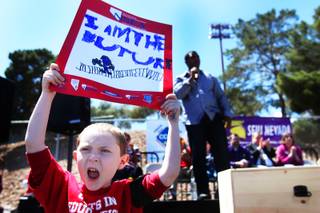Friday, May 13, 2011 | 1:55 a.m.
Sun archives
- Sandoval pushes for budget with reduced cuts (5-3-2011)
- State revenue forecasters to project an additional $72 million to offset budget hole (4-26-2011)
- Senate Republicans refuse to play ball on budget test votes (4-25-2011)
- Shelley Berkley admonishes Nevada lawmakers not to gut education (4-20-2011)
- First public budget debate before full Assembly ends in predictable stalemate (4-20-2011)
- New style of budgeting — probably not a new result (4-17-2011)
- Democrats take budget fight out of money committees, bring it to the floors of the Assembly and Senate (4-11-2011)
- Raggio-style deal-making a no-go this time (4-3-2011)
- Horsford doggedly attacks Sandoval’s budget cuts (3-29-2011)
- Horsford to lawmakers: ‘Talk about our revenue needs’ (3-28-2011)
- Counties fearful of Sandoval’s budget (3-8-2011)
- Republicans issue list of demands to be met before they'll talk taxes (3-3-2011)
- Senior programs not spared from cuts in Sandoval budget (2-2-2011)
- Gov. Brian Sandoval’s budget means job, service cuts for Clark County (1-26-2011)
Successful politics are often about the ability of lawmakers to sell a story that illustrates what they’re pushing. Legislative Democrats are convinced they’ve done just that as they paint pictures of the potential fallout from Gov. Brian Sandoval’s budget cuts. Yet those messages aren’t convincing Nevadans.
Some point to the failure of Carson City journalists to consume and regurgitate the messages. Lawmakers have spoon fed them detailed accounts of coming gloom and doom with massive budget cuts to the state’s colleges and universities, public schools and social service programs. Even so, the stories have been written and broadcast. The messages are out there. But not many Nevadans are speaking out.
They’re not routinely packing legislative hearings in Northern Nevada or the televised satellite sessions in Las Vegas. Parents aren’t flooding potential Republican swing votes in the state Senate and Assembly with letters, emails and phone calls. To be sure, hundreds of messages have been sent. Calls have been made. Dedicated parents and social service users and advocates have turned out in modest numbers for meetings and rallies to oppose the cuts. But the hyperpoliticization of public employees witnessed in Wisconsin, Ohio and elsewhere hasn’t happened in Nevada.
We’re familiar with the theories for this region’s relatively low level of political engagement. People live here but many don’t care about the community. They’re colonists rather than pioneers, taking what they can in hope of eventually leaving rather than committing to staying and building the region.
Add to that, people are emotionally exhausted and physically drained by three years of economic collapse. They’ve lost jobs and a great deal of hope. Personal savings and retirement funds are depleted or gone. Many have lost their homes. Others are trapped in houses that are worth half or a third of the mortgages they hold. This is a state of boom and bust cycles, and on the way up there was an arrogance of sudden-found wealth and success.
On the way down there’s the insecurity and fear that comes with a troubling present and an unknown future. We’re trying to get through the day, and participating in the political process to prevent another round of budget cuts doesn’t quite rise to the level for many of us of feeding the family, keeping or finding a job, and holding onto the house or apartment.
Two weeks ago, a midday rally was held in a Cashman Field parking lot for Clark County School District teachers, support staff, parents and students to protest the cuts as well as changes to the state law that permits teachers to collectively negotiate their contracts. It was a beautiful Saturday afternoon, temperatures in the low 70s, blue skies and a steady breeze.
The parking lot provided plenty of space for thousands of angry people who were opposed to the loss of as many as 1,800 school district jobs. Democratic legislators, union activists and community organizers spoke. They shared tales of increasingly overcrowded classrooms that will hinder the education of tens of thousands of students, the loss of hundreds of enthusiastic first- and second-year teachers, the elimination of vital programs that nurture and retain students.
The crowd heard how the troubled Clark County School District, with its relatively low per-pupil spending and troubling high school dropout rate, needs all of the money it can get.
An estimated 1,200 people showed for the April 30 event sponsored by the Clark County Education Association and the Service Employees International Union. That’s 1,200 people in a region with 309,000 public school students, a school district with 37,300 employees, 18,010 of whom are teachers, a supposedly vocal linchpin to the Democratic Party’s organizational backbone. The event was publicized by fliers distributed to teachers and parents. It was mentioned during PTA meetings and discussed curbside while moms and dads waited for their children at the end of the school day.
Event organizers offered the best public spin they could for the turnout, but many of the participants were privately troubled by the numbers.
“People feel hopeless,” one political organizer said later. “We have a governor who has taken a hard stance against raising taxes. Nevada has a history of cutting budgets incredibly low, and there isn’t a strong history of communications between youth populations and elected officials.”
Then she offered this thought: “This generation is more civically engaged than prior generations. To me the question is, why are they volunteering more but aren’t engaging in the political process? Do they not feel like they really have a voice?”


Join the Discussion:
Check this out for a full explanation of our conversion to the LiveFyre commenting system and instructions on how to sign up for an account.
Full comments policy